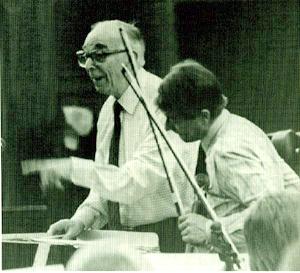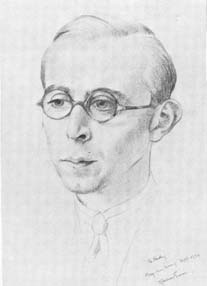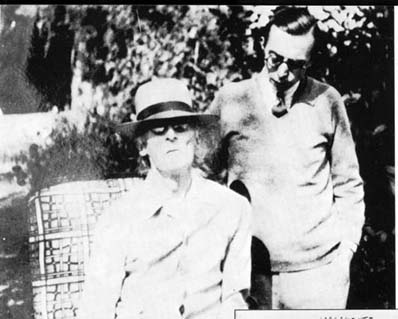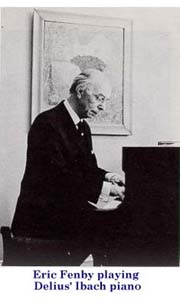

Eric Fenby:
Unsung Hero of Music
ERIC FENBY (1906-1997)
is
best
known
for
his
service
as
amanuensis,
biographer
and
friend to
the great composer Frederick Delius
(1862-1934) during the years 1928 to 1934. But not many realize that
Eric Fenby was also a composer in his own right. He was
chosen by the famed film director Alfred Hitchcock to provide the
musical score for JAMAICA INN (1938). He also wrote orchestral works
and sacred choral music. Some works have unfortunately not
survived; they were withdrawn and/or destroyed by the composer as a
result of his self-critical nature. It is hoped that the
surviving original works of ERIC FENBY will
be
recognized
as
worthy
of
performance
and
recording
as
time
goes on.

Brief Biography
List of Compositions
Recordings/Discography
Literary Works (under
construction)
FULL TEXT OF FENBY'S BOOK "DELIUS AS I KNEW
HIM"
"Fenby on Delius" - Book edited
by Stephen Lloyd
"Menuhin's
House
of
Music"
(Text
by
Eric
Fenby)
Scans from 1982 LSO Concert with Delius works
conducted by Eric Fenby:
Photos of Eric Fenby's Scarborough (courtesy of
Jayne Strutt):
Text of Jayne Strutt's
talk about Eric Fenby
Plaque at the Spa in Scarborough where
Fenby often
conducted: View 1 View 2
Portrait of Eric Fenby by June Mendoza
Portrait of
Eric Fenby by Peter Jackson
VIDEOS:
"SONG
OF
SUMMER"
- Ken Russell's dramatic film about Fenby and Delius
"A
LATE
LARK" - BBC radio play based on material from "Delius As I Knew
Him" (20 minutes)
"SONG OF FAREWELL" - TV documentary about Eric
Fenby Part 1
Part 2
"ROSSINI
ON
ILKLA
MOOR" - orchestral recording with photos of Eric Fenby
"JAMAICA
INN" - Hitchcock film with soundtrack music by Eric Fenby
"A
FENBY
FAREWELL" - Jayne Strutt's video collage with scenes of the
Scarborough area
MIDI Recording of Overture
"Rossini on Ilkla Moor"
Orchestral Recording of
"Rossini on Ilkla Moor"
Sound Clips from SONG OF SUMMER
film
Article by Eric Fenby -
reminiscing about Delius and the SONG OF SUMMER film
Obituary - New York Times,
AP, London Times
The Fenby Memorial Concert
Program
Eric
Fenby Autograph Letter (1947)
Eric Fenby Autograph
(1974)
Eric Fenby
Autograph (1981)
My Letters to Dr. Fenby
.....................................................................................................................................................
Obituary - The Guardian
2/21/1997
Obituary - The Times 2/22/1997
Obituary - The New York Times 3/2/1997
ERIC FENBY, 90, TRANSCRIBER OF DELIUS, DIES
(New York Times Service, 3/3/97)
Eric Fenby, a British musician and musicologist who was a transcriber for the composer Frederick Delius, died on Feb. 18 in Scarborough, England, where he lived. He was 90 years old.
Mr Fenby was trained as an organist and went on to become a
composer, conductor, teacher and author. He was professor of harmony at
the Royal Academy of Music in London from 1964 until 1977.

He is best known for his work in the 1920s and 1930s with Delius (1862-1934). In 1928, hearing that Delius had become virtually helpless because of blindness and paralysis, he wrote and offered to serve him as a kind of secretary. Delius agreed, and Mr. Fenby worked with him at the composer's home in Grez-sur-Loing, near Paris, in extended stays until Delius died almost six years later.
Mr. Fenby gradually worked out a system for transcribing music that
Delius dictated, and the composer went on to produce half a dozen
works.
Sunday, February 23, 1997
The Associated Press
LONDON -- Eric Fenby, whose admiration for Frederick Delius led him to help the composer complete his last work, has died at age 90.
Mr. Fenby died Feb. 18 in Scarborough, his family said. The cause of death was not given.
A precocious musician, Mr. Fenby was appointed organist of Holy Trinity Church in Scarborough when he was 12. The decisive moment in his life was a chance encounter, 10 years later, with the music of Delius.
Mr. Fenby was deeply moved by the music and by the plight of the composer, who was blind and paralyzed.
Mr. Fenby wrote to Delius, first to express his admiration, then to offer his services in helping Delius resume composition.
The offer was accepted, and Mr. Fenby spent much of the next six years working with Delius at his home in the French village of Grez-sur-Loing.
Mr. Fenby's devotion to Roman Catholicism clashed with Delius' forcefully expressed atheism, but the two men found common ground in their Yorkshire roots and their enthusiasm for cricket.
Dictating to Mr. Fenby, Delius completed "Songs of Farewell," for double chorus and orchestra, in 1930. The following year, Delius dedicated "Fantastic Dance," an orchestral piece, to Mr. Fenby. Other fruits of the partnership included "A Late Lark," "Third Violin Sonata," "Caprice" and "Elegy" for cello, "Irmelin Prelude," and "Idyll."
Delius died in 1934, cradled in Mr. Fenby's arms.
[NOTE: The story of Delius and Fenby is unique in the annals of music. Fenby's memoir of that experience, the book "Delius As I Knew Him", is dramatized in the 1968 BBC-TV production, "Song of Summer", directed by Ken Russell. Eric Fenby was a special advisor in the making of this film, which lends it a high level of authenticity. The film is shown at Delius festivals and Ken Russell film festivals, and has also been shown on public broadcasting stations in the U.S.]
.....................................................................................................................................................
(from the Delius Society / Delius Trust Web Site:)
Eric Fenby
Musician, writer, broadcaster.
Friend & amanuensis of Delius.
1906-1997.
Eric Fenby, like Frederick Delius whom he served so well, was a Yorkshireman who loved cricket and the high moors and rugged cliffs of the North Riding of Yorkshire. He was born in Scarborough and his exceptional musical ability was early apparent. Blessed with perfect pitch, he was largely self-taught. Trained as an organist, he held important posts in Scarborough churches in his teens. His various musical skills were soon much in demand, rehearsing local choral societies and amateur orchestras, as well as accompanying singers. He also conducted one or two of his own youthful compositions with the renowned Scarborough Orchestra.
In 1928, a chance hearing on the radio of Delius's orchestral miniature, On Hearing the First Cuckoo in Spring, altered the whole course of his life. He was so profoundly moved, not only by the music, but also by hearing of the composer's sad condition - with music still within him which he was too ill to communicate to paper - that he became obsessed with the idea of assisting him to compose again, meditating long hours on this high up on Cloughton Cliffs, north of Scarborough. He wrote twice to Delius in Grez-sur-Loing and received encouraging acknowledgement. Finally, in October 1928, the 22-year old Fenby crossed to France and there began a remarkable, intuitive, yet highly fraught, collaboration in which the two men, wonderfully supported by the composer's devoted wife Jelka, struggled to bring to life in score the music locked within Delius's ever-active mind and blind and paralysed body. The outcome is unique in the history of music - an important body of works, instrumental, vocal, orchestral amd choral, culminating in the astonishing achievement of the Songs of Farewell, a setting of five poems by Walt Whitman for double chorus and orchestra, first performed in 1932. Fenby helped Sir Thomas Beecham* organise the 1929 Delius Festival in London, attended by the composer, and nursed Delius on his death-bed in 1934. This steadfast friendship was sustained by Fenby's strong Christian faith, not shared by Delius. The book he wrote about his searing, yet rewarding, experiences, Delius as I knew him, published in 1936, is a classic piece of musical biography/autobiography.These formative years are dramatically portrayed in the Ken Russell TV film, Song of Summer, first screened in 1967 and many times since.
The post-war years were spent raising a young family in Scarborough and building up the first music department of the North Riding Training College. He was awarded the OBE for his successful direction of the 1962 Delius Centenary Festival in Bradford. From 1964 to 1977, he was Professor of Harmony at the Royal Academy of Music in London, lectured widely and broadcast frequently, as well as becoming a devoted and much-loved President of the Delius Society and the Delius Association of Florida. In 1968 he returned to the Delius house in Grez-sur-Loing for the first time, an overwhelming experience, later sensitively portrayed in the Yorkshire TV film, Song of Farewell. A wonderful 'Indian Summer' of conducting in the early 80's resulted in the award-winning recordings, A Fenby Legacy, of works he had helped Delius to re-create or complete.
His last years were plagued by debilitating illness, through which he was nursed at home by his devoted wife Rowena and daughter Ruth, and supported by the constant sympathetic interest and correspondence of his many friends from all over the world, not least those of the Delius Society. He died peacefully at home, surrounded by his family, early in the morning of February 18 1997, at the age of 90. A fitting 90th birthday tribute was given to him in 1996 in the book, Fenby on Delius, a compilation of more than 50 years of his writings, lectures and broadcasts on his friend Frederick Delius, lovingly put together by Stephen Lloyd.
His son Roger said, after his death, - "I think he dedicated his life to the music of Delius because nothing that ever happened to him after those years quite compared. Everything flowed from that time. He once said there was no one who could compare with Delius."
Equally, there was no one who could compare with Eric Fenby.
With grateful acknowledgement to Lionel Carley and Stephen
Lloyd for use of material from their obituaries of Eric Fenby in The
Guardian and The Times respectively.
.....................................................................................................................................................

Here is a brief biography of Dr. Fenby taken from the Cyclopedia of Music:
FENBY, Eric (b. Scarborough, Yorkshire, April 22, 1906; d. Scarborough, Yorkshire, Feb. 18, 1997), composer; self-taught except for some piano, organ and cello lessons in his youth. He was organist of a local church between the ages of twelve and eighteen, but came to dislike the organ and took to musical studies by himself in 1924. He continued this until 1928 when he went to Grez-sur-Loing (France) to act as secretary to Frederick Delius, whom he did not know personally, but of whose afflictions of blindness and paralysis he had heard. By great efforts of patience he devised a system whereby he could take down Delius' music from dictation. He remained at Grez until the latter's death in 1934 and published his experiences in a book, "Delius As I Knew Him" (1936). As a composer he sacrificed his own ambitions entirely to the interests of the charitable work he had undertaken; but he had conducted a work for string orchestra at Scarborough in 1925 and written some small pieces.
(From the program notes for the 1984 Delius Festival:)
After Delius' death, Fenby entered the employ of the music publisher Boosey and Hawkes. In 1939 he wrote the score for Alfred Hitchcock's film JAMAICA INN. After the war he founded the music department of the North Riding Training School. He was awarded the O.B.E. after being the successful artistic director for the 1962 Bradford Delius Festival. Thereafter he joined the faculty of the Royal Academy of Music. He has made numerous recordings, including the definitive performances found in THE FENBY LEGACY. He was advisor to Ken Russell for the film SONG OF SUMMER and was the subject of a documentary film by Yorkshire Television called SONG OF FAREWELL.
......................................................................................................................................................
Eric Fenby willingly lived in the shadow of Delius' genius from age 22 until his death at age 90. He will be remembered with heartfelt gratitude for his dedication to his art and for his great service to the world of music.
......................................................................................................................................................